24 apr 2016
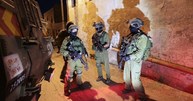
Several Palestinians were kidnapped by the Israeli occupation forces (IOF) at dawn Sunday in a mass-abduction sweep launched across the occupied West Bank and Occupied Jerusalem.
According to a PIC journalist, six Palestinians were kidnapped by the IOF from Occupied Jerusalem, Bethlehem, and Qalqilya at predawn time on Sunday.
The IOF rolled into eastern Qalqilya, in the northern occupied West Bank, and kidnapped a youngster after they wreaked havoc on his family home and aggressively attacked his parents and relatives.
The IOF stormed Bethlehem’s town of Beit Fajjar and ravaged civilian homes before they kidnapped a number of Palestinian youths. The occupation soldiers summoned the injured youngster Youssef Taqatqa for interrogation after they detained him for hours. A Palestinian youngster was injured by the shrapnel of a stun grenade fired by the IOF in Silwan town.
Another was detained by the occupation soldiers. The IOF also pitched a military checkpoint near the entrance to al-Issawiya town, to the northeast of Occupied Jerusalem. The Palestinian Prisoner Society (PPS) said two unidentified Palestinian youths were kidnapped by the IOF from the holy al-Aqsa Mosque.
Earlier, on Saturday evening, the IOF kidnapped the two youngsters Ahmad Kiswani and Ahmad al-Shaweesh from Occupied Jerusalem, PPS further noted. According to data released by the PPS, 27 Palestinians were kidnapped by the IOF on Friday and Saturday.
According to a PIC journalist, six Palestinians were kidnapped by the IOF from Occupied Jerusalem, Bethlehem, and Qalqilya at predawn time on Sunday.
The IOF rolled into eastern Qalqilya, in the northern occupied West Bank, and kidnapped a youngster after they wreaked havoc on his family home and aggressively attacked his parents and relatives.
The IOF stormed Bethlehem’s town of Beit Fajjar and ravaged civilian homes before they kidnapped a number of Palestinian youths. The occupation soldiers summoned the injured youngster Youssef Taqatqa for interrogation after they detained him for hours. A Palestinian youngster was injured by the shrapnel of a stun grenade fired by the IOF in Silwan town.
Another was detained by the occupation soldiers. The IOF also pitched a military checkpoint near the entrance to al-Issawiya town, to the northeast of Occupied Jerusalem. The Palestinian Prisoner Society (PPS) said two unidentified Palestinian youths were kidnapped by the IOF from the holy al-Aqsa Mosque.
Earlier, on Saturday evening, the IOF kidnapped the two youngsters Ahmad Kiswani and Ahmad al-Shaweesh from Occupied Jerusalem, PPS further noted. According to data released by the PPS, 27 Palestinians were kidnapped by the IOF on Friday and Saturday.
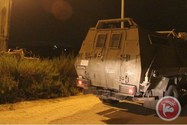
Israeli forces detained at least four Palestinians during predawn raids Sunday in the occupied West Bank, and two Palestinians were injured when clashes broke out between Palestinian youths and Israeli forces in Silwan.
In the the southern occupied West Bank district of Bethlehem, Israeli forces stormed the village of Beit Fajjar and detained former prisoner Omar Anwar Thawabtah and briefly detained Yousif Louy Thawabtah before they released and summoned him to meet with Israeli intelligence, locals said.
An Israeli army spokesperson told Ma’an that one Palestinian was detained near Bethlehem.
Israeli forces also detained Muhammad Marwan al-Barghouthi in the northern West Bank district of Qalqiliya, according to the spokesperson and local sources.
In occupied East Jerusalem, Israeli forces detained Ahmad al-Kiswani, locals said.
Clashes broke out between the Palestinian youths and Israeli forces in the village of Silwad in the central West Bank district of Ramallah when forces raided the village and delivered a summons to a Palestinian man to meet with Israeli intelligence.
The spokesperson for the Israeli army said one Palestinian was detained near Qalandiya in the central occupied West Bank.
Locals told Ma’an two Palestinians were shot and injured by Israeli forces after the two threw an IED at Israeli forces in the East Jerusalem village of Silwan.
An IED also exploded overnight Saturday when Palestinians targeted an Israeli watchtower near Bilal Bin Rabah mosque in northern Bethlehem. In Hebron, Palestinians threw another IED at Israeli forces, locals said.
Since the beginning of 2016, Israeli forces have carried out a weekly average of 96 search and detention operations in the occupied Palestinian territory, according to The United Nations Office for the Coordination of Humanitarian Affairs.
In the the southern occupied West Bank district of Bethlehem, Israeli forces stormed the village of Beit Fajjar and detained former prisoner Omar Anwar Thawabtah and briefly detained Yousif Louy Thawabtah before they released and summoned him to meet with Israeli intelligence, locals said.
An Israeli army spokesperson told Ma’an that one Palestinian was detained near Bethlehem.
Israeli forces also detained Muhammad Marwan al-Barghouthi in the northern West Bank district of Qalqiliya, according to the spokesperson and local sources.
In occupied East Jerusalem, Israeli forces detained Ahmad al-Kiswani, locals said.
Clashes broke out between the Palestinian youths and Israeli forces in the village of Silwad in the central West Bank district of Ramallah when forces raided the village and delivered a summons to a Palestinian man to meet with Israeli intelligence.
The spokesperson for the Israeli army said one Palestinian was detained near Qalandiya in the central occupied West Bank.
Locals told Ma’an two Palestinians were shot and injured by Israeli forces after the two threw an IED at Israeli forces in the East Jerusalem village of Silwan.
An IED also exploded overnight Saturday when Palestinians targeted an Israeli watchtower near Bilal Bin Rabah mosque in northern Bethlehem. In Hebron, Palestinians threw another IED at Israeli forces, locals said.
Since the beginning of 2016, Israeli forces have carried out a weekly average of 96 search and detention operations in the occupied Palestinian territory, according to The United Nations Office for the Coordination of Humanitarian Affairs.
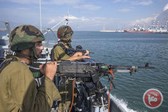
Israeli naval forces on Sunday morning detained two Palestinian fishermen off the coast of the Gaza Strip and seized their fishing boat, local sources told Ma'an.
Locals told Ma'an that Israeli naval forces opened fire on fishing boats, and detained Oranus al-Sultan and Ibrahim al-Sultan and took them to unknown location.
The sources added that Israeli forces seized fishing equipment and the boat.
As part of Israel's near-decade long blockade of the coastal enclave since 2007, Palestinian fishermen have been required to work within a limited "designated fishing zone" off the coast, which was recently extended to nine nautical miles.
Israeli forces regularly detain Palestinian fisherman off the coast of Gaza working within the fishing zone, generally for alleged security reasons.
According to the Palestinian Center for Human Rights, Israeli forces detained 71 fishermen and confiscated 22 fishing boats throughout 2015.
The center said that Israeli naval forces also opened fire on Palestinian fishermen at least 139 times over the course of the year, wounding 24 and damaging 16 fishing boats.
"These attacks occurred in a time where the fishers did not pose any threat to the Israeli naval troops, as they were doing their job to secure a living," the center said.
Locals told Ma'an that Israeli naval forces opened fire on fishing boats, and detained Oranus al-Sultan and Ibrahim al-Sultan and took them to unknown location.
The sources added that Israeli forces seized fishing equipment and the boat.
As part of Israel's near-decade long blockade of the coastal enclave since 2007, Palestinian fishermen have been required to work within a limited "designated fishing zone" off the coast, which was recently extended to nine nautical miles.
Israeli forces regularly detain Palestinian fisherman off the coast of Gaza working within the fishing zone, generally for alleged security reasons.
According to the Palestinian Center for Human Rights, Israeli forces detained 71 fishermen and confiscated 22 fishing boats throughout 2015.
The center said that Israeli naval forces also opened fire on Palestinian fishermen at least 139 times over the course of the year, wounding 24 and damaging 16 fishing boats.
"These attacks occurred in a time where the fishers did not pose any threat to the Israeli naval troops, as they were doing their job to secure a living," the center said.
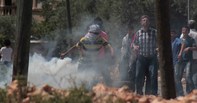
Several Palestinian and foreign activists suffered injuries during clashes on Saturday with Israeli soldiers in Kafr Qaddum town, east of Qalqiliya.
According to local sources, the clashes broke out when Israeli troops invaded the town and attacked the participants in the weekly anti-settlement march with tear gas and rubber bullets.
One young man suffered a rubber bullet injury in his right hand and was rushed to hospital for treatment.
Many local citizens and foreign activists also suffered from inhaling tear gas during the events. Since July 2011, weekly demonstrations are held in the town to protest the Israeli closure of a main road.
According to local sources, the clashes broke out when Israeli troops invaded the town and attacked the participants in the weekly anti-settlement march with tear gas and rubber bullets.
One young man suffered a rubber bullet injury in his right hand and was rushed to hospital for treatment.
Many local citizens and foreign activists also suffered from inhaling tear gas during the events. Since July 2011, weekly demonstrations are held in the town to protest the Israeli closure of a main road.
23 apr 2016
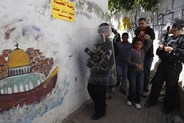
Israeli forces on Friday raided the Silwan neighborhood of occupied East Jerusalem, issuing five demolition orders and threatening indictments against their Palestinian homeowners, amid a surge of demolitions in the area.
Fakhri Abu Diyab, a member of a Silwan-based committee formed to fight such demolitions in Silwan, told Ma’an that the Israeli authorities delivered demolition orders for five homes belonging to the Abu Rajab and Awwad families in the al-Bustan area, which were constructed over 30 years ago.
The Jerusalem municipality’s local affairs court previously asked the homeowners to provide testimony at a hearing, but the homeowners did not attend, according to the Wadi Hilweh Information Center.
The notices delivered Friday were issued as final warnings to the homeowners, threatening that if they did not appear in court, indictments would be filed against them under Article 212.
Abu Diyab added that while Israeli forces raid Silwan every Friday and Saturday and deliver demolition orders, the notices issued this week threatening indictment were a new development.
“It is threatening to use article 212,” Abu Diyab told Ma’an, because the article allows the public prosecution to demolish houses without providing clear reasons, and to punish homeowners with fines or prison time.
Article 212 is invariably used when the state fails to provide enough evidence to convict the building owner for construction without a license, or in cases where it is not able to order a fine or a demolition order under article 205.
Daniel Sidelman from the Jerusalem Terrestrial organization said that the “aggressive” move by the Israeli authorities threatening indictments under article 212 is not unprecedented “but far from routine.”
Abu Diyab highlighted that the increase of notices suggests that the municipality is planning to move forward with controversial development plans in the neighborhood, which have been frozen for years following international pressure.
Sidelman agreed that targeting the al-Bustan area was a “particularly troubling and ominous indication” that the municipality is planning to go forward with plan.
“The communities (in Silwan) are at risk in ways other communities are not at risk. They are constantly targeted by (Israeli) settlers and authorities, and the distinction between settlers and the Israeli authorities has been completely blurred,” Sidelman told Ma’an.
The municipality began issuing demolition orders and indictments to homes in al-Bustan in 2005 as part of the Israeli authorities plan to establish the Jewish site “King David’s Garden” in Silwan and around the "Holy Basin," which includes many Christian and Muslim holy sites.
In 2009 the municipality announced its intention to demolish 88 homes in al-Bustan, to displace some 1,500 people. Article 212 was cited as the legal justification for many of these demolitions.
Elsewhere in Silwan on Friday, Israeli forces raided the al-Abbasiya, Bir Ayyub, and Wadi Hilweh neighborhoods while municipality workers photographed structures. Authorities also hung a demolition order on a six-story building belonging to the al-Zir family, which is home to 30 people, according to the Wadi Hilweh Information Center.
Silwan is one of many Palestinian neighborhoods in occupied East Jerusalem that is seeing an influx of Israeli settlers at the cost of home demolitions and the eviction of Palestinian families.The area has also recently come under heightened presence of Israeli military forces.
Earlier this month, two Palestinian-owned buildings in Silwan were issued demolition orders, and it is estimated at least 18 Palestinian families are currently at risk of displacement due to recent demolition orders, Abu Diyab told Ma’an at the time.
Silwan residents -- like most Palestinians in Jerusalem -- have long engaged in efforts to prevent their displacement by the Israeli government, which has aimed to establish a Jewish majority since Israel first illegally occupied East Jerusalem in 1967.
Palestinians' ability to build homes or expand existing structures legally is severely limited by the Jerusalem municipality, and more than 3,000 Palestinian structures have been demolished since 1967, according the PLO Negotiations Affairs Department.
The Wadi Hilweh Information Center in February said the Israeli authorities were escalating demolitions in Silwan in particular, and the Israeli National Council for Planning and Building recently approved a massive building project planned by Israeli settlement organization Elad in Silwan.
PLO Executive Committee member Hanan Ashrawi said the approval was a clear sign that Israel was "deliberately isolating Jerusalem from its Palestinian environs and indigenous people and transforming it into an exclusively Jewish city."
Lily Leach contributed reporting from Bethlehem.
Fakhri Abu Diyab, a member of a Silwan-based committee formed to fight such demolitions in Silwan, told Ma’an that the Israeli authorities delivered demolition orders for five homes belonging to the Abu Rajab and Awwad families in the al-Bustan area, which were constructed over 30 years ago.
The Jerusalem municipality’s local affairs court previously asked the homeowners to provide testimony at a hearing, but the homeowners did not attend, according to the Wadi Hilweh Information Center.
The notices delivered Friday were issued as final warnings to the homeowners, threatening that if they did not appear in court, indictments would be filed against them under Article 212.
Abu Diyab added that while Israeli forces raid Silwan every Friday and Saturday and deliver demolition orders, the notices issued this week threatening indictment were a new development.
“It is threatening to use article 212,” Abu Diyab told Ma’an, because the article allows the public prosecution to demolish houses without providing clear reasons, and to punish homeowners with fines or prison time.
Article 212 is invariably used when the state fails to provide enough evidence to convict the building owner for construction without a license, or in cases where it is not able to order a fine or a demolition order under article 205.
Daniel Sidelman from the Jerusalem Terrestrial organization said that the “aggressive” move by the Israeli authorities threatening indictments under article 212 is not unprecedented “but far from routine.”
Abu Diyab highlighted that the increase of notices suggests that the municipality is planning to move forward with controversial development plans in the neighborhood, which have been frozen for years following international pressure.
Sidelman agreed that targeting the al-Bustan area was a “particularly troubling and ominous indication” that the municipality is planning to go forward with plan.
“The communities (in Silwan) are at risk in ways other communities are not at risk. They are constantly targeted by (Israeli) settlers and authorities, and the distinction between settlers and the Israeli authorities has been completely blurred,” Sidelman told Ma’an.
The municipality began issuing demolition orders and indictments to homes in al-Bustan in 2005 as part of the Israeli authorities plan to establish the Jewish site “King David’s Garden” in Silwan and around the "Holy Basin," which includes many Christian and Muslim holy sites.
In 2009 the municipality announced its intention to demolish 88 homes in al-Bustan, to displace some 1,500 people. Article 212 was cited as the legal justification for many of these demolitions.
Elsewhere in Silwan on Friday, Israeli forces raided the al-Abbasiya, Bir Ayyub, and Wadi Hilweh neighborhoods while municipality workers photographed structures. Authorities also hung a demolition order on a six-story building belonging to the al-Zir family, which is home to 30 people, according to the Wadi Hilweh Information Center.
Silwan is one of many Palestinian neighborhoods in occupied East Jerusalem that is seeing an influx of Israeli settlers at the cost of home demolitions and the eviction of Palestinian families.The area has also recently come under heightened presence of Israeli military forces.
Earlier this month, two Palestinian-owned buildings in Silwan were issued demolition orders, and it is estimated at least 18 Palestinian families are currently at risk of displacement due to recent demolition orders, Abu Diyab told Ma’an at the time.
Silwan residents -- like most Palestinians in Jerusalem -- have long engaged in efforts to prevent their displacement by the Israeli government, which has aimed to establish a Jewish majority since Israel first illegally occupied East Jerusalem in 1967.
Palestinians' ability to build homes or expand existing structures legally is severely limited by the Jerusalem municipality, and more than 3,000 Palestinian structures have been demolished since 1967, according the PLO Negotiations Affairs Department.
The Wadi Hilweh Information Center in February said the Israeli authorities were escalating demolitions in Silwan in particular, and the Israeli National Council for Planning and Building recently approved a massive building project planned by Israeli settlement organization Elad in Silwan.
PLO Executive Committee member Hanan Ashrawi said the approval was a clear sign that Israel was "deliberately isolating Jerusalem from its Palestinian environs and indigenous people and transforming it into an exclusively Jewish city."
Lily Leach contributed reporting from Bethlehem.
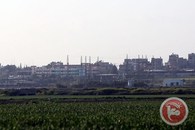
Israeli forces opened fire on Palestinian farmers on Saturday morning in the southern Gaza Strip, locals said.
Witnesses told Ma'an that Israeli forces stationed near the borderline along Khan Yunis opened fire on agricultural lands where the farmers were working. No injuries were reported.
An Israeli army spokesperson said they were looking into reports.
Israeli military forces routinely enter the Gaza Strip near the “buffer zone,” which lies on the border between the besieged enclave and Israel.
Israeli military activities, which have become almost daily occurrences, often interfere with Palestinian farmers whose land lies in the area.
Approximately 35 percent of Palestinian agricultural land in Gaza is inaccessible without high personal risk, according to the Palestinian Center for Human Rights.
The Israeli army says the use of live fire is necessary to deter potential "security threats." However, the practice has destroyed much of both the agricultural and fishing sectors of the impoverished coastal enclave, which has been under Israeli blockade for nearly a decade.
Witnesses told Ma'an that Israeli forces stationed near the borderline along Khan Yunis opened fire on agricultural lands where the farmers were working. No injuries were reported.
An Israeli army spokesperson said they were looking into reports.
Israeli military forces routinely enter the Gaza Strip near the “buffer zone,” which lies on the border between the besieged enclave and Israel.
Israeli military activities, which have become almost daily occurrences, often interfere with Palestinian farmers whose land lies in the area.
Approximately 35 percent of Palestinian agricultural land in Gaza is inaccessible without high personal risk, according to the Palestinian Center for Human Rights.
The Israeli army says the use of live fire is necessary to deter potential "security threats." However, the practice has destroyed much of both the agricultural and fishing sectors of the impoverished coastal enclave, which has been under Israeli blockade for nearly a decade.
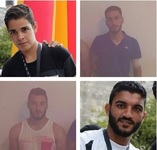
Four Palestinian youths from Jerusalem were assaulted Thursday by Israeli forces at the entrance to the city of Eilat in southern Israel, one of the youths told Ma'an Saturday.
Muhammad al-Daqqaq said he was with three of his friends, identified as Noor al-Shalabi, Anas Mazid, and Abed al-Karim al-Natsheh, on their way to Eilat Thursday evening when they were stopped by Israeli soldiers near a checkpoint at the entrance to the city.
Israeli forces checked their IDs, ordered them out of their vehicle, and brought them to an interrogation room where they were searched, verbally insulted, and beaten.
Al-Daqqaq said Israeli forces questioned them on their reasons for visiting the city, and an officer said, “you throw rocks at our forces in Jerusalem -- why are you coming here?”
The youths were held and searched individually while their vehicle underwent inspection.
He added that al-Shalabi was taken a second time into the room and assaulted, causing him to faint and lose consciousness. An ambulance later took him to a hospital inside Eilat.
Mistreatment by Israeli forces against Palestinians in Israel and the occupied Palestinian territory is regular, has long received criticism from the international community.
Muhammad al-Daqqaq said he was with three of his friends, identified as Noor al-Shalabi, Anas Mazid, and Abed al-Karim al-Natsheh, on their way to Eilat Thursday evening when they were stopped by Israeli soldiers near a checkpoint at the entrance to the city.
Israeli forces checked their IDs, ordered them out of their vehicle, and brought them to an interrogation room where they were searched, verbally insulted, and beaten.
Al-Daqqaq said Israeli forces questioned them on their reasons for visiting the city, and an officer said, “you throw rocks at our forces in Jerusalem -- why are you coming here?”
The youths were held and searched individually while their vehicle underwent inspection.
He added that al-Shalabi was taken a second time into the room and assaulted, causing him to faint and lose consciousness. An ambulance later took him to a hospital inside Eilat.
Mistreatment by Israeli forces against Palestinians in Israel and the occupied Palestinian territory is regular, has long received criticism from the international community.
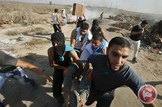
Five Palestinians were injured when clashes broke out across the Gaza Strip on Friday night after Israeli forces attempted to suppress weekly protests, Gaza’s Ministry of Health said.
One Palestinian was injured with live fire, and two suffered from excessive tear gas inhalation near the Nahal Oz crossing in the northeastern Gaza Strip.
Near the Erez crossing in the northern Gaza Strip, two Palestinians suffered from excessive tear gas inhalation when Israeli forces attempted to suppress a protest there.
An Israeli army spokesperson told Ma’an they did not have information on clashes in the Gaza Strip Friday evening.
Also on Friday, a Palestinian teenager was wounded by a rubber-coated steel bullet and dozens others suffered excessive tear gas inhalation when Israeli forces dispersed weekly protests across the occupied West Bank.
The clashes came amidst tightened security measures implemented by the Israeli authorities for the Jewish holiday of Passover. All crossings in the Gaza Strip and occupied West Bank were closed to Palestinians beginning midnight Thursday, in effect until midnight Saturday.
Palestinians in the Gaza Strip crowd near the borders with Israel every Friday to show solidarity with what Palestinians in besieged coastal enclave have termed the “Jerusalem Intifada” taking place in the occupied West Bank and East Jerusalem.
Nearly 30 Palestinians have been killed by Israeli forces in the Gaza Strip since the unrest spread in October, the majority shot dead during clashes on the Gaza-Israel border.
More than 1,300 Palestinians have been injured by Israeli forces since the start of this year, the majority during clashes that broke out with the Israeli military during protests in the occupied West Bank, according to the UN Office for the Coordination of Humanitarian Affairs.
Earlier this month, the US accused Israel of an "excessive use of force" against Palestinians, amounting to a violation of human rights, in its annual report of global human rights abuses.
One Palestinian was injured with live fire, and two suffered from excessive tear gas inhalation near the Nahal Oz crossing in the northeastern Gaza Strip.
Near the Erez crossing in the northern Gaza Strip, two Palestinians suffered from excessive tear gas inhalation when Israeli forces attempted to suppress a protest there.
An Israeli army spokesperson told Ma’an they did not have information on clashes in the Gaza Strip Friday evening.
Also on Friday, a Palestinian teenager was wounded by a rubber-coated steel bullet and dozens others suffered excessive tear gas inhalation when Israeli forces dispersed weekly protests across the occupied West Bank.
The clashes came amidst tightened security measures implemented by the Israeli authorities for the Jewish holiday of Passover. All crossings in the Gaza Strip and occupied West Bank were closed to Palestinians beginning midnight Thursday, in effect until midnight Saturday.
Palestinians in the Gaza Strip crowd near the borders with Israel every Friday to show solidarity with what Palestinians in besieged coastal enclave have termed the “Jerusalem Intifada” taking place in the occupied West Bank and East Jerusalem.
Nearly 30 Palestinians have been killed by Israeli forces in the Gaza Strip since the unrest spread in October, the majority shot dead during clashes on the Gaza-Israel border.
More than 1,300 Palestinians have been injured by Israeli forces since the start of this year, the majority during clashes that broke out with the Israeli military during protests in the occupied West Bank, according to the UN Office for the Coordination of Humanitarian Affairs.
Earlier this month, the US accused Israel of an "excessive use of force" against Palestinians, amounting to a violation of human rights, in its annual report of global human rights abuses.
22 apr 2016
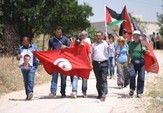
Israeli soldiers attacked, Friday, the weekly nonviolent protest against the Annexation Wall and colonies, in Bil’in village near Ramallah, causing dozens to suffer the effects of tear gas inhalation. The protest marks the seventh anniversary of Bassem Abu Rahma’s death, who was killed by the Israeli army in a nonviolent protest.
The protest was organized by the Popular Committee against the Wall, with the participation of Israeli and international peace activists, and dozens of Palestinians.
The protesters marched from the center of the village, carrying Palestinian and Tunisian flags, in addition to pictures of Bassem Abu Rahma, while chanting for national unity, and calling for ending the Israeli occupation, removing the colonies, liberation and the release of all detainees.
The soldiers fired many rubber-coated steel bullets, and long-range gas bombs, causing dozens of residents and activists to suffer the effects of tear gas inhalation, in addition to causing many olive and almond trees to burn. The burnt trees belong to Haitham Khatib and Hashem Bornat.
It is worth mentioning that Bassem Abu Rahma was killed in April of 2009, while his sister, Jawaher, died on January 01, 2011, due to severe effects of tear gas inhalation, after the soldiers attacked a nonviolent protest in Bil’in,
The protest was organized by the Popular Committee against the Wall, with the participation of Israeli and international peace activists, and dozens of Palestinians.
The protesters marched from the center of the village, carrying Palestinian and Tunisian flags, in addition to pictures of Bassem Abu Rahma, while chanting for national unity, and calling for ending the Israeli occupation, removing the colonies, liberation and the release of all detainees.
The soldiers fired many rubber-coated steel bullets, and long-range gas bombs, causing dozens of residents and activists to suffer the effects of tear gas inhalation, in addition to causing many olive and almond trees to burn. The burnt trees belong to Haitham Khatib and Hashem Bornat.
It is worth mentioning that Bassem Abu Rahma was killed in April of 2009, while his sister, Jawaher, died on January 01, 2011, due to severe effects of tear gas inhalation, after the soldiers attacked a nonviolent protest in Bil’in,
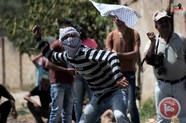
A Palestinian teenager was wounded by a rubber-coated steel bullet and dozens others suffered excessive tear gas inhalation when Israeli forces dispersed weekly protests across the occupied West Bank on Friday.
Popular resistance coordinator Murad Shtewei told Ma'an Israeli forces fired tear gas canisters, stun grenades, and rubber-coated steel bullets at demonstrators taking part in the weekly protest in the northern West Bank village of Kafr Qaddum.
A 15-year-old teenager was treated on the scene after he was hit by a rubber-coated bullet in the arm.
Shtewei said hundreds took part in the protest, chanting nationalistic Palestinian songs and calling for an end to the Israeli occupation.
Residents of Kafr Qaddum stage regular protests against land confiscations as well as the closure of the village's southern road by Israeli forces. The road, which has been closed 13 years, is the main route to the nearby city of Nablus, the nearest economic hub.
Meanwhile, dozens of activists suffered excessive tear gas inhalation when Israeli forces suppressed the weekly protest in the village of Bilin.
Israeli forces fired rubber-coated steel bullets, tear gas, and stun grenades at protesters as they approached the Israeli separation wall.
Locals said that a swath of farmland planted with olive and almond trees, belonging to local residents Haytham al-Khatib and Hashim Burnat, caught fire when Israeli forces chased activists in the fields.
Many villages in the occupied West Bank and Jerusalem participate in weekly Friday protests, including Nabi Saleh, Nillin, and al-Masara.
Israeli forces have come under repeated criticism for excessive use force and methods of crowd control that often result in death or injury of protesters.
Popular resistance coordinator Murad Shtewei told Ma'an Israeli forces fired tear gas canisters, stun grenades, and rubber-coated steel bullets at demonstrators taking part in the weekly protest in the northern West Bank village of Kafr Qaddum.
A 15-year-old teenager was treated on the scene after he was hit by a rubber-coated bullet in the arm.
Shtewei said hundreds took part in the protest, chanting nationalistic Palestinian songs and calling for an end to the Israeli occupation.
Residents of Kafr Qaddum stage regular protests against land confiscations as well as the closure of the village's southern road by Israeli forces. The road, which has been closed 13 years, is the main route to the nearby city of Nablus, the nearest economic hub.
Meanwhile, dozens of activists suffered excessive tear gas inhalation when Israeli forces suppressed the weekly protest in the village of Bilin.
Israeli forces fired rubber-coated steel bullets, tear gas, and stun grenades at protesters as they approached the Israeli separation wall.
Locals said that a swath of farmland planted with olive and almond trees, belonging to local residents Haytham al-Khatib and Hashim Burnat, caught fire when Israeli forces chased activists in the fields.
Many villages in the occupied West Bank and Jerusalem participate in weekly Friday protests, including Nabi Saleh, Nillin, and al-Masara.
Israeli forces have come under repeated criticism for excessive use force and methods of crowd control that often result in death or injury of protesters.
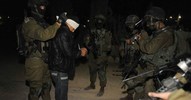
The Israeli occupation forces (IOF) at predawn time on Friday kidnapped two Palestinians from the southern West Bank province of al-Khalil after they wreaked havoc on their family homes.
The Israeli occupation army claimed responsibility for the abduction of two allegedly wanted Palestinians from al-Khalil on account of their involvement in anti-occupation activities.
Meanwhile, the occupation troops stormed Palestinian shops in al-Khalil’s southern neighborhoods and were deployed on their rooftops to provide extremist settlers with a security shield on the occasion of the Jewish Passover holiday.
The Israeli occupation army claimed responsibility for the abduction of two allegedly wanted Palestinians from al-Khalil on account of their involvement in anti-occupation activities.
Meanwhile, the occupation troops stormed Palestinian shops in al-Khalil’s southern neighborhoods and were deployed on their rooftops to provide extremist settlers with a security shield on the occasion of the Jewish Passover holiday.

Israeli naval forces opened fire on Friday at Palestinian fishermen while sailing off Beit Lahiya shores, north of Gaza Strip. Local sources affirmed that no injuries were reported during the attack.
The attack is the second of its kind within 48 hours, as Palestinian fishing boats were targeted Wednesday by Israeli forces also off Beit Lahiya shores.
The Israeli naval forces regularly open fire at fishermen, force them to take off their clothes, and swim in cold seawater before arresting them. In addition, their boats and equipment are either destroyed or confiscated and taken to Ashdod seaport.
Al-Mezan center for human rights stressed in a recent report that the fisherman’s right to work is an inherent human right, and that the Israeli forces are committing systematic violations of International Human Rights Law by repeatedly targeting fishermen often resulting in death, injury, and arbitrary arrest in a degrading manner, as well as depriving fishermen of their livelihoods and the right to work.
The attack is the second of its kind within 48 hours, as Palestinian fishing boats were targeted Wednesday by Israeli forces also off Beit Lahiya shores.
The Israeli naval forces regularly open fire at fishermen, force them to take off their clothes, and swim in cold seawater before arresting them. In addition, their boats and equipment are either destroyed or confiscated and taken to Ashdod seaport.
Al-Mezan center for human rights stressed in a recent report that the fisherman’s right to work is an inherent human right, and that the Israeli forces are committing systematic violations of International Human Rights Law by repeatedly targeting fishermen often resulting in death, injury, and arbitrary arrest in a degrading manner, as well as depriving fishermen of their livelihoods and the right to work.
